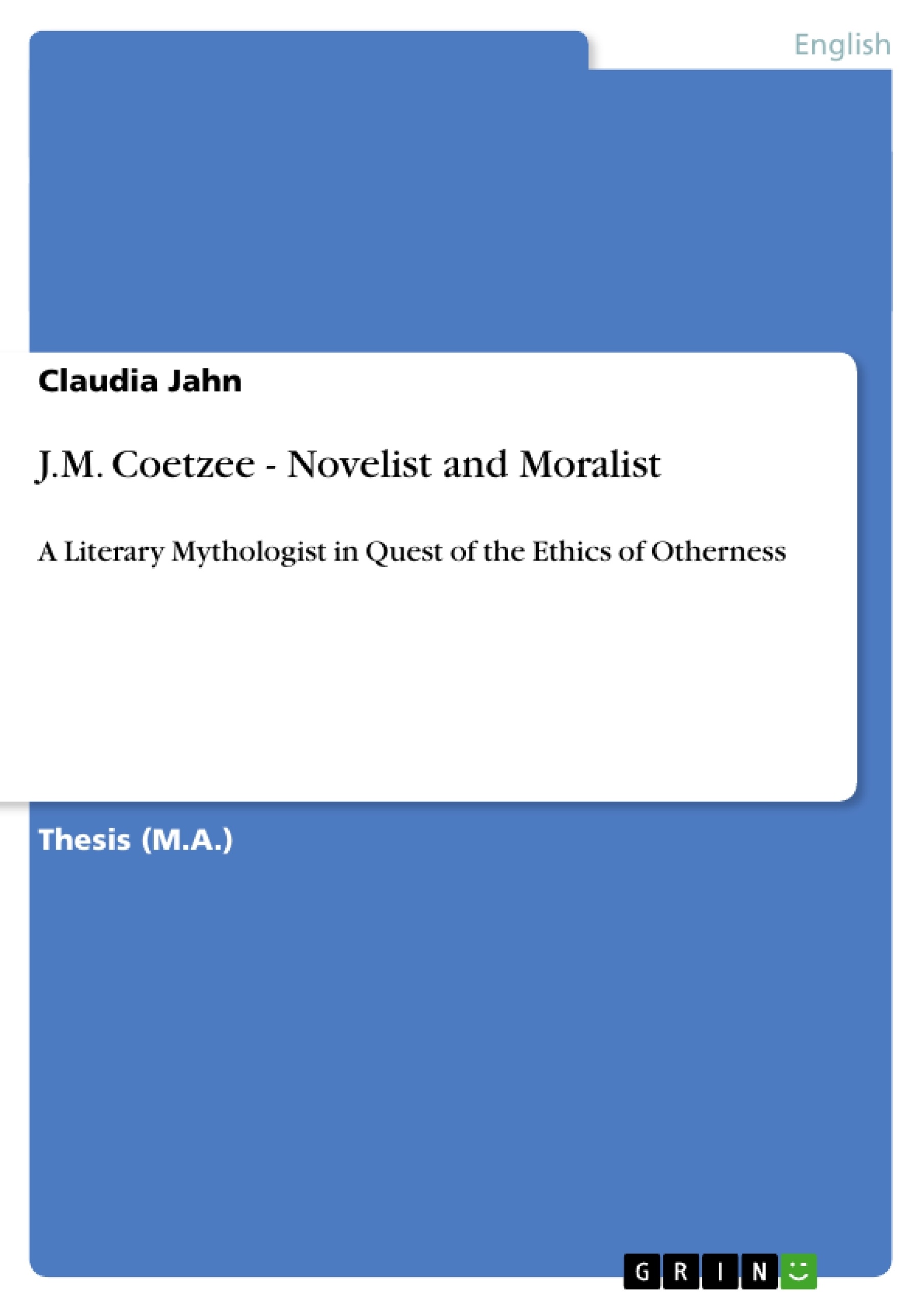Can literature burst the bonds of reality which congeal the self and the other in a fixed constellation? How can one write against the imposition of power without enforcing one’s own opinion? And how can the other be represented justly without obliterating its outline with the mere notion of a just picture?
Taking off his glasses, Coetzee can provide an answer to these questions which is as vague as an unbespectacled look into the mirror must be.
Inhaltsverzeichnis (Table of Contents)
- Introduction
- Social Casework
- The Principle(s) of Civilisation
- The Mechanisms of Civilisation
- State Order
- The Morality of Myth
- Another Image
- Christian Mythology
- Greek Mythology
- The Real Myth
- An Individual Perspective
- Accepting the Other
- The Real Thing
- A Variety of Realities
- The Writing of History
- Establishing Historical Consciousness
- Avoiding Myth
- Another Image
- Conscious Writing
- Denominating the Demon
- The Writer's Commitment - The Exorcism of the Demon
- Writing of Literature
- The Reader's Share
- The Languorous Linguist
Zielsetzung und Themenschwerpunkte (Objectives and Key Themes)
This work examines the literary and ethical dimensions of J.M. Coetzee's work, focusing on his role as a novelist and moralist. The text analyzes his engagement with the concept of "otherness" and its implications for literature and society.- Coetzee's response to South African history and the impact of apartheid.
- The ethical challenges of representing the "other" in literature.
- The relationship between literature, truth, and the construction of reality.
- The role of myth in understanding individual and societal morality.
- The writer's commitment to social responsibility and the implications for writing.
Zusammenfassung der Kapitel (Chapter Summaries)
- Introduction: This chapter introduces the main argument of the work, highlighting Coetzee's engagement with questions of ethics and otherness, and emphasizing the symbolic significance of his "glasses-off" approach to writing.
- Social Casework: This section delves into the societal context of Coetzee's work, focusing on themes of civilization, social hierarchies, and the mechanisms of power in South Africa.
- The Morality of Myth: This chapter explores the role of myth in Coetzee's writing, analyzing the use of Christian and Greek mythology to examine the ethical complexities of confronting the other.
- Conscious Writing: This section focuses on the writer's responsibility to engage with social issues and represent otherness ethically. It discusses the challenges of writing about sensitive topics and the importance of engaging readers in a critical dialogue.
Schlüsselwörter (Keywords)
This work centers on the intersection of literature, ethics, and otherness in J.M. Coetzee's work. Key themes include: South African history, postcolonial identity, representation, myth, moral philosophy, the author's responsibility, and the reader's role in engaging with literature.Frequently Asked Questions
What is the central focus of J.M. Coetzee's work according to this text?
The text focuses on Coetzee's role as both a novelist and a moralist, specifically examining how his literature engages with ethics, South African history, and the concept of "otherness."
How does Coetzee respond to the history of apartheid?
Coetzee's work addresses the impact of apartheid by analyzing social hierarchies, mechanisms of power, and the ethical challenges of representing those marginalized by the state order.
What role does myth play in Coetzee's writing?
The analysis explores how Coetzee uses Christian and Greek mythology to examine individual and societal morality and the complexities of confronting the "other."
What is meant by the "glasses-off" approach to writing?
It is a symbolic description of Coetzee's method of engaging with truth and reality, suggesting a perspective that avoids clear-cut impositions of power or fixed opinions.
What are the ethical challenges of representing the "other" in literature?
The challenge lies in representing the other justly without obliterating their unique outline or enforcing the writer's own subjective notion of a "just picture."
What is the "reader's share" in Coetzee's work?
The "reader's share" refers to the active role the reader plays in engaging with the critical dialogue and moral questions presented in the literature.
- Arbeit zitieren
- M.A. Claudia Jahn (Autor:in), 2007, J.M. Coetzee - Novelist and Moralist, München, GRIN Verlag, https://www.grin.com/document/141654



